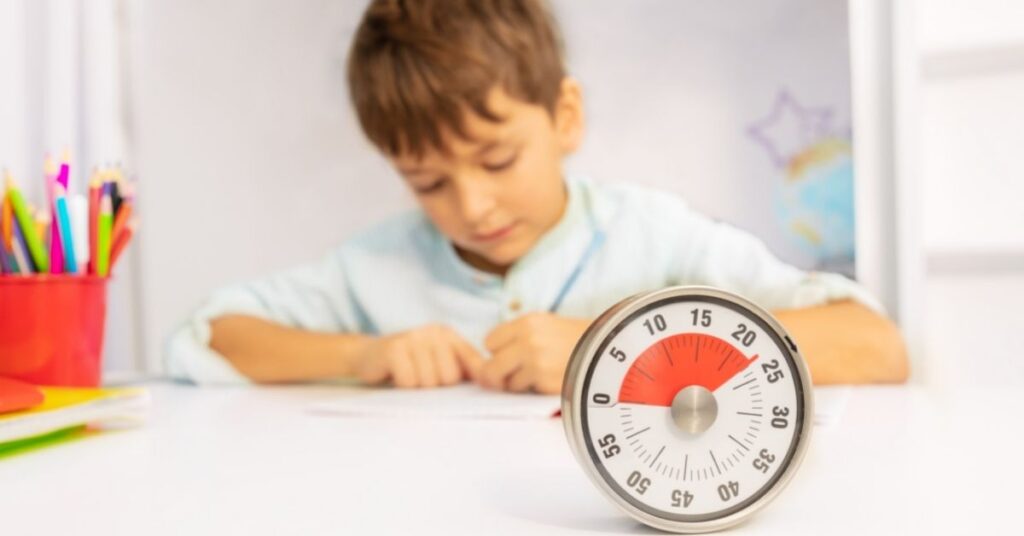Your child or teen is smart, and you know they are capable of doing better in school. Yet, you see missed homework assignments, low grades on tests and lack of organization in their notebooks, folders and backpack for school. You know that if they can learn to apply themselves, then their grades will improve. One thing that could help is learning better study habits. So how can you help your autistic and ADHD student implement effective study habits?
Why do students with ADHD have a hard time studying?
Children and teens with autism and ADHD often find school difficult due to a lack of executive function skills. The authors of “Smart but Scattered Teens” define executive functions skills as “the brain-based, cognitive processes that help us to regulate our behavior, make decisions and set and achieve goals. These skills include task initiation and follow through, planning/organization, working memory, performance monitoring, inhibition of impulses, and self-regulation.”
So if your child or teen is struggling with executive function skills, it makes sense that developing effective studying habits would be difficult. Read this blog post about executive function skills and 12 ways that you can help your child improve them.
My son J has a really hard time studying for tests and having good habits around homework and school projects. Because he is struggling with some of his classes in high school and needs to learn effective study habits, we researched them together and developed a study plan for him. In fact, I made sure that he did most of the work so that it was a plan that he created himself. That way, he has more buy-in. However, getting him to follow his study plan is not easy, and we are still working on that. I do believe once he finally gets into the habit of studying and using the steps in his plan, we will see an improvements in his grades and attitude toward school.
Effective studying habits

So what do effective study habits look like so that you can help your autistic and ADHD student develop these habits? Here are some suggestions that may help your child.
1. Have a designated study place
It is good if your child or teen has a designated place to study that has the supplies they need and is quiet. For us, our son J mostly studies in our home office. If I am working from home that day, then he uses a table set up in our master bedroom. This allows him to be away from everyone else and the noise in the house, however, my husband or I do have to check on him periodically to ensure he is staying on task.
2. Use a timer for study times
When J was younger, we loved the Time Timer (affiliate link) because it allowed him to see the time he had left visually. Now, J uses the clock app on his phone to set blocks of 20 to 30 minutes for study time. Then, he takes a break of about the same amount of time. After his break, he sets the timer for another study session. He repeats this until he is done. Most of the time, he can finish homework and studying in one to two study sessions.
3. Find a planner your child or teen will use to write down assignments, etc.
I know some kids are resistant to using planners (J certainly has been!), but they really are effective for writing down assignments, due dates, project steps and more. J is slowly learning how to use one, but it does take time and lot of check-ins from parents to ensure it’s being completed. I know that if J can learn to use a planner (a simple weekly version – affiliate link), then it will benefit him greatly throughout his life.
4. Encourage them to create flashcards and/or rewrite notes
One of the best ways to learn is to write the information by hand. Creating flashcards is a great way to accomplish that and develop a tool that can be used to study for tests! I provide J with a good supply of blank index cards, and I gave him an index card organizer (affiliate link) to keep track of them. If you wanted to get fancier for your child, you could get them these blank cards on a binder ring (affiliate link) so they aren’t lost.
5. Be their study partner for tests and quizzes
Help them study for their tests by using the flashcards with them or asking them questions from completed review guides or notes from their class. This can be a very effective way for them to go over the information in the days leading up to a test.

6. Have them read through their notes right before bed
J thought I was nuts to advise him to read his notes before he goes to bed. I explained that our brains are amazing and that it will continue to process and remember the information while he sleeps.
7. Make their notes fun and interesting
Encourage your child or teen to have fun with their study notes. They can use colored ink pens or use highlighters to emphasize important information. They can even draw diagrams or make doodles next important facts on their notes. People with ADHD need to novelty and fun, and this can help their notes not be so “boring” 🙂
8. Urge your child to think of unconventional or different ways to study
For example, J put in his plan that he can walk in our neighborhood while studying his notes and flashcards. (Yes, he has to pay attention to where he is walking though!)
9. Don’t cram for tests
Studying for a cram session the night before the test is not a good way to study. Encourage your student to begin studying at least three days before the test. They can use flashcards, review guides, Quizlet (if their teacher uses it for their class) or other study aids.
Develop a study plan
Talk to your child or teen and ask them which of these (or all of them) will help them study best. Have them do some additional research online about study habits. Are there other ways of studying that appeal to your teen? If so, have them develop their own study plan. That is what J and I did.
We researched, and he read through several articles with suggestions. Then he wrote down what he thought would work best for him. We then created a study plan for him that we hang on the wall next to our desk in the home office and above the table in our bedroom (his two designated study places). Here is a generic version of that plan to give you a sample to help you and your child or teen create theirs.
Have you helped your autistic and ADHD student develop effective study habits? What works for your child? What additional tips do you have? Leave a comment so that we can share and encourage each other on this journey.







